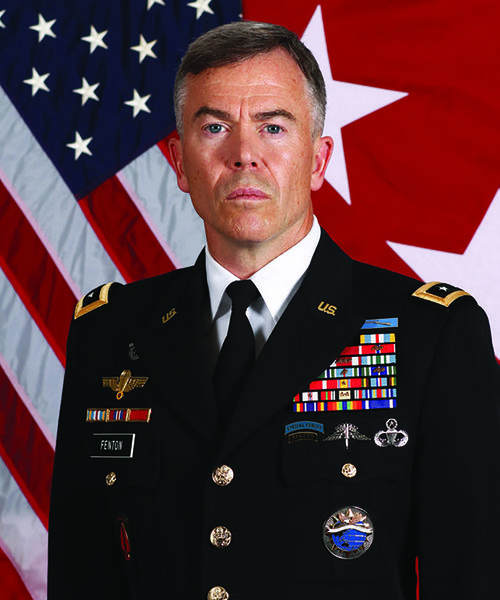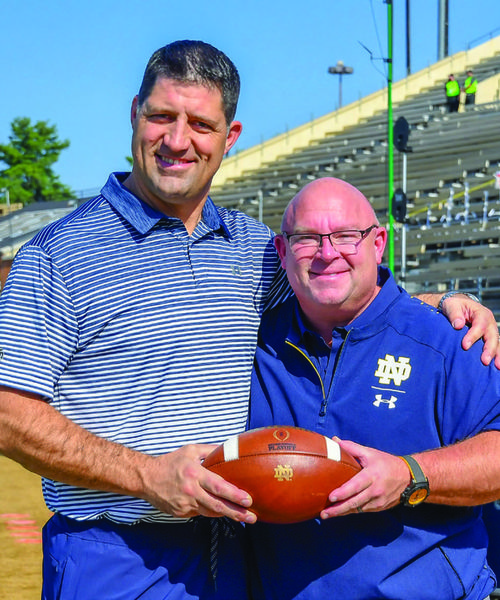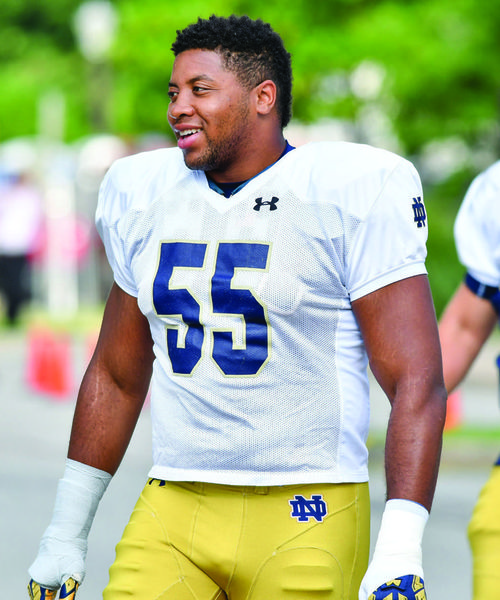
Bryan Fenton
Service for All
A 40-18 loss at Tennessee during the 1979 season isn’t mentioned among the great moments in University of Notre Dame football history. However, for one fan at Neyland Stadium that day, it became part of the foundation to a life and career devoted to the magical mantra of “God, Country, Notre Dame.”
Bryan Fenton grew up in Knoxville, Tennessee, cheering for the Fighting Irish in large part because of his
paternal grandparents who emigrated from Ireland as teens and settled in Pittsburgh. They, along with the rest of their predominantly Irish neighborhood, rooted for Notre Dame and that fervor made its way to Fenton some 500 miles south. It also was fitting that he attended Knoxville Catholic High School, nicknamed the Fighting Irish.
When the Notre Dame football team traveled to Knoxville to face the University of Tennessee in November 1979, Fenton wasn’t going to miss the chance to see the Fighting Irish up close.
“I sold Cokes at Neyland Stadium and had a chance to run down to the fence that separates the field and talk to some of the players as they were doing their pregame walk,” says Fenton, a freshman in high school at the time. “I also had a chance to talk to (former University executive vice president) Father (Edmund) Joyce.
“The next day at my church, where I was an altar boy, I told our priest what had happened. So, during Mass when he goes up to give the homily, he tells the parishioners that he has a special treat for them. He asks me to come up and talk about my experience meeting the Notre Dame football team and Father Joyce. I had a chance to turn my visit with the team into a homily for the congregation — which was a lot of fun for me but I’m not sure it was for them.”
Despite the affinity for Notre Dame, no one from Fenton’s family had attended the University. In order for him to make the dream a reality, he would need more than a strong desire and good grades.
“Notre Dame was my school of choice, but our family didn’t have the resources to pay for it,” Fenton says. “My parents talked about different scholarship options. Nobody from my family had been in the military, yet I filled out an ROTC application and the Air Force ROTC accepted me. After my first year, I decided that the Air Force wasn’t the best fit for me, so I joined Army ROTC a year later.
“My ROTC experience proved to be phenomenal. The instructors, including Col. Doug Hemphill, a professor of military science who I still keep in touch with, and everyone else was top-notch. The ROTC part taught me time management skills because I had to perform ROTC requirements, attend classes, study and participate in extracurricular activities.”
Fast forward more than 30 years and several posts throughout the world, and Fenton now is Notre Dame’s second-highest ranked alumnus who has served — or is serving — in the U.S. Army. In 2017, he received a third star, the title of lieutenant general, and he became the first special operations officer to assume the job of deputy commander at U.S. Pacific Command (USPACOM) in Honolulu. Comprising more than 400,000 soldiers, sailors, airmen, Marines and civilian employees, USPACOM oversees U.S. military operations in the Indo-Pacific region.
“As the deputy commander, I assist the commander and other teammates in Indo-Pacific command,” Fenton says. “The Indo-Pacific region stretches from as far west as India to the shores of the U.S. West Coast, as far up as South Korea and Japan and as far south as Australia. More than half the earth’s surface and more than 50 percent of the world’s population is contained inside those four corners.
It’s an extremely important region to the United States as a Pacific nation. We have documents from our president and the secretary of defense which say the Indo-Pacific region, where Hawaii is dead center, is the most consequential region for the United States for decades to come. That’s based on the economies here, the trade here — and the amount of people who wish to have a connection with the United States.”
While his job has considerable responsibilities and his decisions can have significant ramifications, Fenton acknowledges he’s just one piece of the puzzle. He says his most important task is the one that’s directly in front of him at that time. That’s a mindset he developed at Notre Dame, but not just through ROTC or the classroom.
Even though he already had a packed schedule of academic and ROTC commitments, Fenton wanted a chance to be involved with another passion of his: athletics. He decided to join the student manager program and ultimately got his wish to work with the football team. In just a few short years, he went from being in earshot of the Irish players at Neyland Stadium to being a part of every Notre Dame gridiron practice and game. He also gained a mentor.
“I had the honor and good fortune of working for coach Lou Holtz while I was at Notre Dame,” Fenton says. “As we stood on the sidelines watching many a practice during his first year at Notre Dame, Coach Holtz would talk to me about his MBA — though when he spoke about an MBA, he meant ‘Made by Army.’ He’d talk about the sergeants, the corporals and the privates who shaped him when he was a lieutenant. He shared with me that leading soldiers prepared him in many ways for being a coach and that serving the nation was a tremendous responsibility. I never forgot our sideline talks or his speeches about trust, love and commitment. Later in my military career, I shared them with my teams and troops.”
In 1987, Fenton graduated from Notre Dame with a bachelor’s degree in marketing and was commissioned as an Army second lieutenant. As a career infantry/special forces officer, Fenton has served at various locations in the United States and overseas, participating in numerous missions including Operation Joint Forge (Bosnia), Operation Enduring Freedom (Afghanistan/Africa), Operation Iraqi Freedom (Iraq) and Operation Odyssey Dawn (Libya).
“Like every organization, you begin by understanding the ground floor of an enterprise,” Fenton says. “I started my career being assigned in Berlin, Germany, before — then after — the fall of the Berlin Wall. It was incredibly insightful to see the significant relevance of the United States and our connection with other nations. Witnessing the East Germans come across and have their taste of freedom solidified even more my commitment to want to serve the nation.
“I also had the opportunity to contribute right after 9/11 in the Middle East, both in Afghanistan and Iraq. I saw the challenges in that region that I couldn’t have even imagined until I put boot to sand.”
In 2014, Fenton was promoted to the rank of brigadier general and then advanced to the position of major general in 2016 as the commander of Special Operations Command, Pacific.
“Every time someone asks me what’s kept me in the military this long, my answer is the people,” Fenton says. “The types of people I get a chance to be around, work with and get motivated by every day are incredible. This group of folks from all walks of life, all races, genders, creeds, orientations, all states and territories in the United States, and almost every nation in the world has decided to serve our nation in this way. It is an honor to be around them.”
Fenton also credits the Army for investing in him. He holds a master of military arts and science degree from the U.S. Army Command and General Staff College at Fort Leavenworth, Kansas, and served as the 2009 Army Fellow in the Walsh School of Foreign Service at Georgetown University. Additionally, Fenton has received negotiation and leadership training at Harvard’s business and law schools.
“I would have never had these opportunities without the Army,” Fenton says. “To be assigned in Berlin, then travel through Eastern Europe right after the Berlin Wall came down couldn’t have been more intriguing. I also was fortunate to be assigned in South America and East and West Africa, the Middle East and now here in Hawaii. The opportunity to see the world through a different pair of lenses is unsurpassed.”
In addition to the people, the honor to serve his country has kept Fenton in the military for over three decades. The topic of service stays near and dear to his heart and comes up frequently when he discusses his love for Notre Dame and what it stands for.
“The standard that Notre Dame sets in terms of education, the whole-person concept and service gets ingrained in you for the rest of your life,” Fenton says. “When you come to Notre Dame, it’s not just about studying, and it’s not just about athletics. You have to be able to do it all, and Notre Dame sets an extremely high standard. I’ve taken that with me as part of my DNA.”
That passion for Notre Dame led Fenton back to the University even during his bustling life in the military. Fenton served on the Monogram Club board of directors from 2011 to 2015. In 2017, the Monogram Club honored Fenton with its highest honor, the Edward “Moose” Krause Distinguished Service Award.
During his time on the Monogram Club board, Fenton organized trips for fellow board members — as well as Irish teams — to the Walter Reed National Military Medical Center in Bethesda, Maryland, to visit wounded veterans.
“Every time we have an opportunity to go into Bethesda Walter Reed or our hospitals around the world, I am uplifted by the spirit of our teammates who are going through these hard times,” Fenton says. “They do it with grace, strength and resiliency. I leave a better person after the visit and certainly recognize the things that I could do better. You think you’re going to go in to cheer somebody up, but in reality, you’re the one who gets cheered up.”
The sacrifices made during a life in the military come in many forms.
“The separation from family and friends is the hardest part,” Fenton says. “Like many of my military teammates, I’ve missed birthdays, anniversaries, family celebrations for my immediate and extended family. The bumps of daily life and very important things occur, and I hate to be away, but that’s what we do.
Thank goodness I have an enormously capable and understanding family.”
Those family members include his wife, Dawn, and their two daughters, Nora and Cecilia, as well as parents John and Kathleen who still live in Knoxville. Nora, who is three years older than Cecilia, is a sophomore at Notre Dame, and, like her father over three decades ago, joined the Army ROTC program. Just as the love for Notre Dame made its way from Pittsburgh to Knoxville all those years ago, Fenton’s affection for the school found its way to the next generation of his family.
“It’s exciting because I know the experience I had there,” Fenton says about Nora attending Notre Dame. “You wish that for your kids, no matter where they go to college. You want them to have those types of experiences in life — the ability to grow, meet great people, be at a faith-based institution and experience a culture of service. I know what it meant for me to be at Notre Dame, and I think Nora is having a similar experience.”
That experience will involve countless walks across campus and passes by the Basilica of the Sacred Heart, where engraved into the stone are those words: “God, Country, Notre Dame.”
And Fenton understands what that means as well as anyone.

